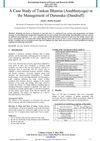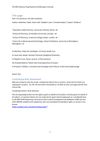 3 citations,
April 2011 in “Expert Review of Dermatology”
3 citations,
April 2011 in “Expert Review of Dermatology” Mesotherapy lacks strong evidence for effectiveness and safety, and its ingredients are not FDA-approved for subcutaneous use.
[object Object]  January 2023 in “Skin appendage disorders”
January 2023 in “Skin appendage disorders” Hair loss is common in autoimmune diseases and can be an early sign of the condition, often requiring prompt treatment to prevent permanent damage.
 September 2023 in “Journal of The American Academy of Dermatology”
September 2023 in “Journal of The American Academy of Dermatology” Patients with skin cancer on the scalp and ear in Mexico have specific features and results from their treatments.
 16 citations,
May 1998 in “International Journal of Dermatology”
16 citations,
May 1998 in “International Journal of Dermatology” Stress hormones like cortisol may trigger psoriasis flare-ups.
 May 2024 in “International Journal of Science and Research (IJSR)”
May 2024 in “International Journal of Science and Research (IJSR)” Tankan Bhasma mixed with coconut oil effectively reduced dandruff and improved scalp health.
 October 2024 in “Journal of Case Reports in Medical Science”
October 2024 in “Journal of Case Reports in Medical Science” Psychiatric symptoms can be early signs of systemic lupus erythematosus.
 16 citations,
August 2011 in “Annals of Allergy Asthma & Immunology”
16 citations,
August 2011 in “Annals of Allergy Asthma & Immunology” A woman with severe angioedema improved significantly after treatment with rituximab.
 11 citations,
August 2009 in “Dermatologic Surgery”
11 citations,
August 2009 in “Dermatologic Surgery” A man developed a rare scalp disorder, Folliculitis Decalvans, 20 years after hair restoration surgery, and it required long-term antibiotic treatment.
 3 citations,
July 2022 in “The Journal of Dermatology”
3 citations,
July 2022 in “The Journal of Dermatology” COVID-19 infection can cause new hair loss conditions or worsen existing skin diseases, with hair loss being the most common issue.
 3 citations,
September 2016 in “Hair transplant forum international”
3 citations,
September 2016 in “Hair transplant forum international” Southeast and East Asian men typically have straighter hairlines with less recession and lower hair density, which is important to consider in hair restoration surgery.
 6 citations,
February 2016 in “British Journal of Dermatology”
6 citations,
February 2016 in “British Journal of Dermatology” A woman with a drug allergy to anakinra was successfully desensitized, allowing her to continue treatment without allergic reactions.
 11 citations,
January 1998 in “Dermatology”
11 citations,
January 1998 in “Dermatology” Isotretinoin effectively treated severe acne in HIV-positive women, with improved skin and CD4 counts, but some experienced side effects like skin dryness and hair loss.
 1 citations,
April 2018 in “The journal of investigative dermatology/Journal of investigative dermatology”
1 citations,
April 2018 in “The journal of investigative dermatology/Journal of investigative dermatology” Oral tofacitinib significantly improves lichen planopilaris symptoms without adverse effects.
August 2023 in “Jurnal kedokteran dan kesehatan/Jurnal Kedokteran dan Kesehatan” Medical students need better stress management and support to improve well-being and performance.
 2 citations,
February 2022 in “BMJ”
2 citations,
February 2022 in “BMJ” Emollients can make fabrics more flammable, so take safety precautions.
 9 citations,
January 2014 in “Annals of Dermatology”
9 citations,
January 2014 in “Annals of Dermatology” Some breast cancer patients on hormonal therapy may develop male or female pattern hair loss, which can sometimes be improved with topical treatments.
 January 2023 in “Asian Journal of Pediatric Research”
January 2023 in “Asian Journal of Pediatric Research” Trichoscopy is crucial for diagnosing and assessing alopecia areata in children.
7 citations,
August 2006 in “Maturitas” Cimicifuga racemosa extract may help prevent and treat prostate issues by inhibiting 5α-reductase.
 September 2017 in “Springer eBooks”
September 2017 in “Springer eBooks” Older East and Southeast Asian men need less hair density for hair restoration satisfaction, and natural hairline features should guide surgery plans.
 14 citations,
January 2006 in “Australasian journal of dermatology”
14 citations,
January 2006 in “Australasian journal of dermatology” Alopecia areata can look like frontal fibrosing alopecia, making diagnosis hard.
 77 citations,
March 2014 in “Cold Spring Harbor Perspectives in Medicine”
77 citations,
March 2014 in “Cold Spring Harbor Perspectives in Medicine” Fat cells are important for healthy skin, hair growth, and healing, and changes in these cells can affect skin conditions and aging.
3 citations,
September 2021 in “BioEssays” Dandruff might be caused by changes in how hair follicles naturally release oils and an immune response to this imbalance.
5 citations,
July 2018 in “Skin appendage disorders” Sunscreen spray on the scalp may be linked to a type of scarring hair loss.
 2 citations,
January 2011 in “Andrologia”
2 citations,
January 2011 in “Andrologia” Flutamide and a new synthetic steroid affected brain and prostate chemicals and showed potential for treating androgen-related conditions and epilepsy.
 May 2024 in “Journal of cosmetic dermatology”
May 2024 in “Journal of cosmetic dermatology” Heat-treated Limosilactobacillus fermentum with menthol, salicylic acid, and panthenol promotes hair growth and balances scalp microbiome in people with androgenetic alopecia.
[object Object] Hair can naturally regain color after greying, and this change may be linked to stress levels.
 April 2021 in “International Journal of Research in Dermatology”
April 2021 in “International Journal of Research in Dermatology” Most adult females with acne do not have hormonal imbalances, but some show signs of excess male hormones.
 February 2023 in “International Journal of Advanced Research in Science, Communication and Technology”
February 2023 in “International Journal of Advanced Research in Science, Communication and Technology” Herbal shampoos with Neem and Tulsi might be safer and more effective for controlling dandruff.
 December 2004 in “Medicine”
December 2004 in “Medicine” Pregnancy can cause skin changes and may affect pre-existing skin conditions, with some treatments not safe for use during pregnancy.

Finasteride reduces prostate cancer risk but may increase high-grade tumors; new drugs and better diagnosis are in development, but funding and industry commitment are challenges.

























